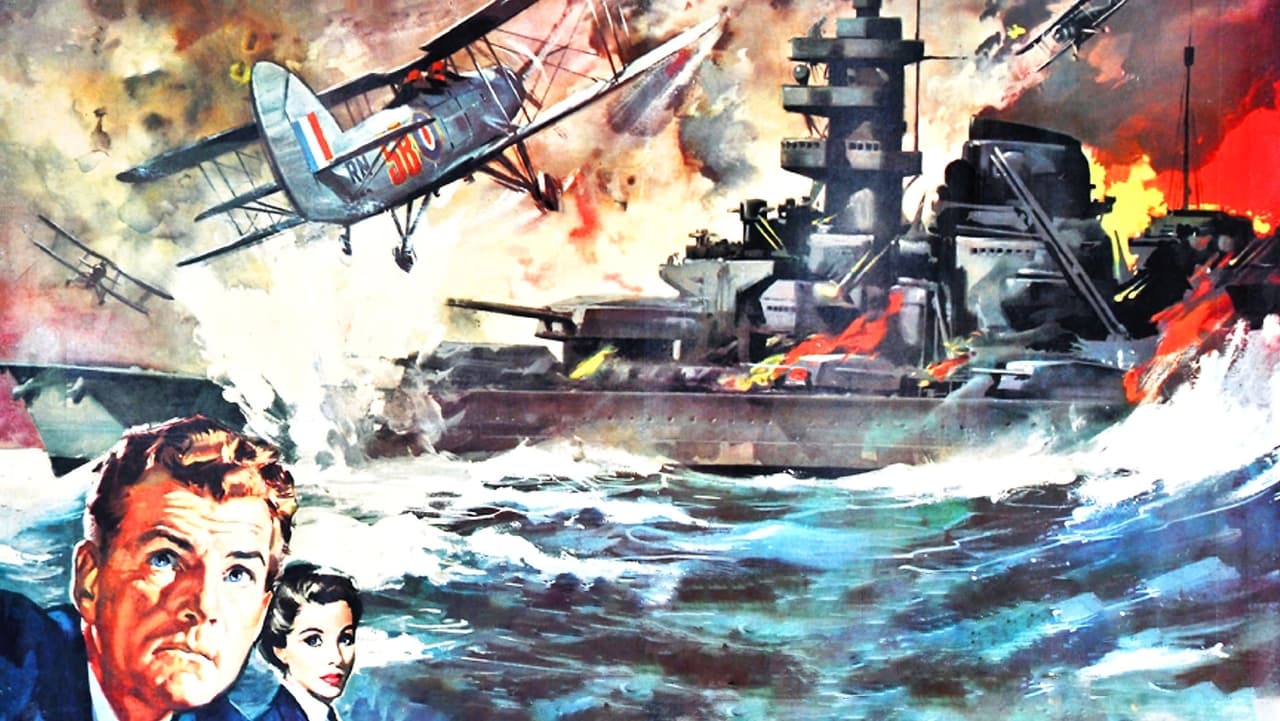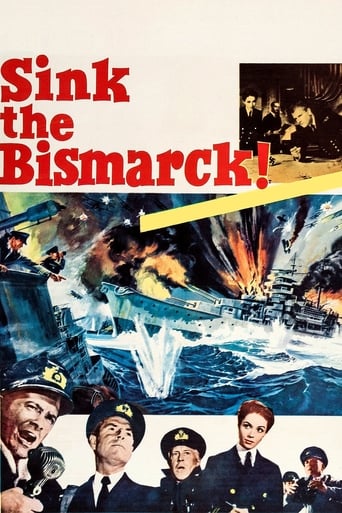



Good concept, poorly executed.
This film is so real. It treats its characters with so much care and sensitivity.
View MoreIf you're interested in the topic at hand, you should just watch it and judge yourself because the reviews have gone very biased by people that didn't even watch it and just hate (or love) the creator. I liked it, it was well written, narrated, and directed and it was about a topic that interests me.
View MoreStrong acting helps the film overcome an uncertain premise and create characters that hold our attention absolutely.
View MoreSINK THE BISMARCK! is a solid British WW2 movie about the hunt for the German battleship and the efforts of the British navy to destroy it. What I liked about this film was the direction, by THE SPY WHO LOVED ME's Lewis Gilbert; he gives it a stark look enhanced by the black and white photography, and helps to make this a film full of documentary realism particularly in the battle scenes.Not that this is a pure action film, because a lot of it is about the logistics of mounting a full-scale operation to pinpoint and attack a battleship. To this end we get an absolutely huge cast of British performers that acts as a genuine who's who of British cinema at the time. The cast ranges from the solid Kenneth More and Laurence Naismith as the leads to the likes of British film regulars Sam Kydd and Michael Ripper playing cameos. The film I can most liken this to is A NIGHT TO REMEMBER, a similar documentary-style film about the sinking of the Titanic, also starring More.
View MoreIn May 1941 the mighty German battleship Bismarck, accompanied by the cruiser Prinz Eugen, left her home port in the Baltic on a mission to attack British convoys in the North Atlantic. The two ships were intercepted in the Denmark Strait, between Greenland and Iceland, by the British warships HMS Hood and HMS Prince of Wales. In the ensuing exchange of fire the Hood was sunk, with the loss of all but three of her crew, and the Prince of Wales and the Bismarck were both damaged. The German commander, Admiral Günther Lütjens, therefore decided to return to a port in occupied France so that the Bismarck could be repaired. The ship was, however, pursued across the Atlantic by the Royal Navy, determined to avenge the loss of the Hood and to neutralise the threat which the Bismarck posed to British shipping. "Sink the Bismarck!" is made in a semi-documentary style, concentrating less upon the actual combatants than upon what have been described as the "unsung back-room planners". (The documentary effect is enhanced by having the American journalist Ed Murrow repeat some of his wartime radio broadcasts from London). The main character, played by Kenneth More, is Captain Jonathan Shepard, the Admiralty's Chief of Operations, responsible for directing the operation from a war room in London. Michael Hordern, playing the Admiral leading the hunt for the Bismarck at sea, has a much smaller role. (Historically this would have been Admiral Sir John Tovey, but his name is never given in the film). More was one of those actors who had a fairly small range but who was capable of giving some very good performances within it. He specialised in playing calm, imperturbable upper-middle-class Englishmen or Scotsmen, often officers in the armed forces. (He could often look out of his depth when he tried to go too far outside this range). Here, however, he is excellent. Shepard is a fictitious character; the film- makers insisted in the closing credits that he was not to be identified with Captain Ralph Edwards, the real Chief of Operations during this period. More plays him as, outwardly, a typical stiff-upper-lip Briton of the era, but one who beneath his calm façade is hiding his own personal traumas. His work is physically less dangerous than service at sea would be, yet nevertheless extremely stressful emotionally; one of Shepard's colleagues, unable to cope with the strain, has announced that he will resign his job in the operations room to take up a position as commander of a naval vessel. In some ways the film is very accurate; the battle scenes were shot using scale models of the actual ships involved. There are a number of historical inaccuracies, but I suspect that these are not "goofs" in the sense of inadvertent errors made through carelessness but deliberate departures from historical fact for the sake of dramatic licence. During the chase the Bismarck sinks a destroyer named HMS Solent; no British destroyers were lost in the battle, and although there was an "HMS Solent" during the war it was a submarine, not a destroyer. A Fairey Swordfish torpedo bomber from the aircraft carrier HMS Ark Royal is shot down, although no aircraft were lost in the actual battle. Both these details were added to increase dramatic tension; one of the crew of the bomber is Shepard's son Tom, and his father must endure an agonising wait for news of his son. Perhaps the greatest departure from historical reality concerns the character of Admiral Lütjens. Karel těpánek plays him as a fanatical Nazi, arrogant and absurdly overconfident. (Peter Finch had given a much more sympathetic portrayal of a senior German naval officer in "Battle of the River Plate" four years earlier). He barks at his crew "Never forget that you are Nazis!"; a real Nazi would probably have said "Never forget that you are National Socialists!" but the truth is that the real Lütjens was not a Nazi at all. He disliked the regime for which he was fighting and, contrary to the way he is portrayed here, was very pessimistic about the Bismarck's chance of success. Yet in the context of the film těpánek's performance is a good one, increasing the dramatic contrast between Lütjens and Shepard, both more cautious and more humane. Patriotic wartime epics, often based upon true stories, were popular in the British cinema during the fifties and sixties, so it is not surprising that the hunt for the Bismarck should have furnished the material for a how-we-won-the-war film. Compared to the high emotions of something like "The Dambusters", perhaps the greatest true story war film, it can at times seem rather cool, yet it is still undoubtedly one of Britain's better efforts in the genre, due particularly to More's efforts. 7/10
View MoreThe style of "Sink the Bismarck!" is a bit unusual for a war film. Much of it is not set on the frontlines on the open sea but within the underground confines of the Cabinet War Rooms--a fortified bunker well below the streets of London. In fact, if you want to visit this site today, you can--and it makes for an interesting couple hours.Within the underground complex, a Captain (Kenneth More) is in charge of coordinating the British Navy's pursuit of the dreaded Bismarck-- one of two incredibly powerful German battleships which terrified the British because its guns were more powerful and armor plating much thicker than on the British naval counterparts. In addition, you do see some battle scenes and while they were done mostly with models (along with a bit of stock footage), they do look rather realistic.So is the film worth seeing? Yes, especially if you enjoy seeing war films AND don't mind the rather cerebral behind the scenes style of the film. By the way, while the acting was very good, I was surprised how bad and unconvincing the voice actor was who pretended to be Churchill. It didn't even sound close. Also, as you see the torpedoes going through the water, look carefully and you can see that in some clips you can see the ropes pulling them through the water!
View More"Sink the Bismarck" (1960) tells the story of the British attempts to destroy the pride of the German fleet, the Bismarck, which enjoyed an enviable career at first, but its success was short-lived. The stars are Kenneth More, Dana Wynter, Karel Stepanek, and Laurence Naismith.I'm no WW II expert as others on this board are, so I won't go into historical facts as presented by this film, except to say that the story was manipulated to present the good guy-bad guy scenario often seen in war films. With films like "Das Boot," we are allowed to see the Germans as human beings, with young men fighting just as our young men did, to defend their country. Here, we have a dedicated Nazi, Admiral Lutjens (Stepanek) as the commander of the Bismarck who wants victory at all costs and seemingly has little concern for his men. At one point, an officer makes a suggestion, which the commander waves off with "I don't care about the sea," and the reply is, "I was thinking of the men." In another scene, he refers to his men as "good Nazis" or some-such phrase. In truth, Admiral Lutjens wasn't a Nazi at all, he was a military man who protected Jews under his command and whose family held anti-Nazi feelings. Secondly, very few soldiers were Nazis. When the British soldiers are told their dangerous orders, the camera gives us close-ups of some of their faces - young men, facing death; we aren't shown anything like this on the Bismarck.This sounds like negative criticism; it really isn't. This is the way war films were presented, and I don't expect a war-torn country to have sympathy for the Germans; it's just that today there is a different sensibility, not about the Nazis and officers, certainly, but about the normal German people.This is a very exciting film with some wonderful acting, particularly by Kenneth More, an officer who tries to stay detached from his emotions and demands formality and discipline from his staff. In truth, he is very different from the image he projects. More shows us a fully fleshed-out character. Lovely Dana Wynter plays his efficient WREN assistant. Her working relationship with More grows throughout the film very convincingly. Stepanek is excellent as Admiral Lutjens, who believes in the complete superiority of his ship. The More character correctly uses the man's pride against him.The effects are incredible, and there looks to be some newsreel footage - grainy footage, anyway - interspersed. Edward R. Murrow broadcasts are included to give the film an air of authenticity. I probably would have preferred the Germans to speak German with subtitles for more reality; a congratulatory note from Hitler written in English is kind of ridiculous.Despite this, "Sink the Bismarck" is well worth seeing, as is just about anything with the marvelous Kenneth More. It's a very stirring movie.
View More